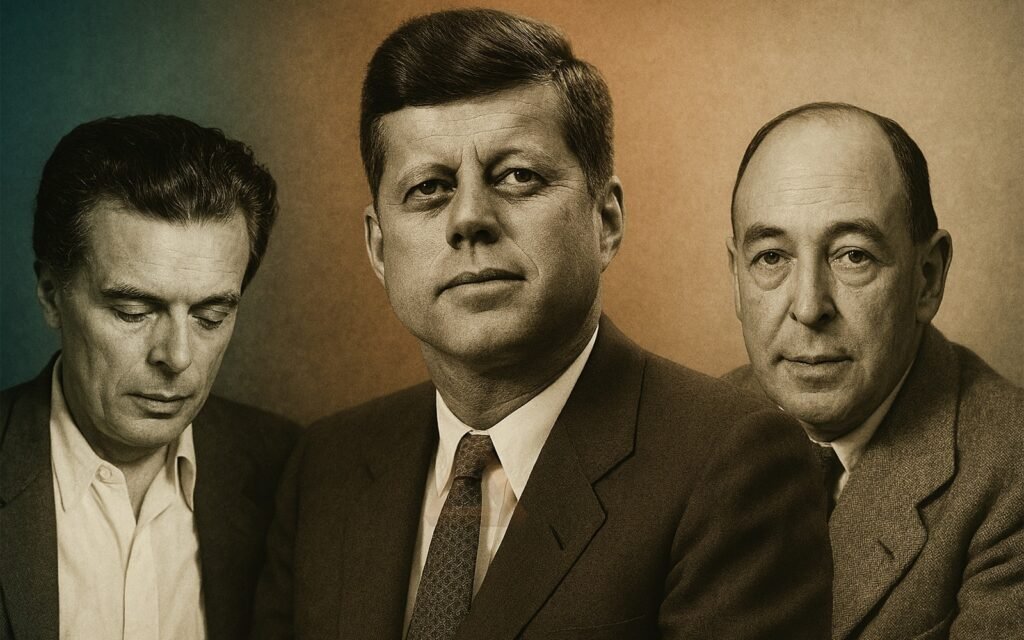
Last updated: 12 November 2025
History doesn’t always unfold one life at a time. Occasionally, two names land in the obituary column on the same day — unrelated, unplanned, and oddly aligned. Some deaths are eclipsed. Others arrive in pairs. What follows isn’t a pattern, just a handful of dates where legacy doubled back on itself. Some were noticed. Many weren’t.
Milton Berle, Dudley Moore, and Billy Wilder — March 27, 2002
Milton Berle died at age 93. He was one of television’s first major stars. Dudley Moore, best known for Arthur, died the same day at 66. Billy Wilder, the director of Sunset Boulevard and Some Like It Hot, died at 95. Their deaths were reported separately. Some outlets noted the concurrent deaths. Most didn’t.
John F. Kennedy, Aldous Huxley, and C.S. Lewis — November 22, 1963
The assassination of John F. Kennedy was so abrupt and disorienting that it consumed every available headline. That same day, Aldous Huxley and C.S. Lewis — two literary figures whose work shaped the philosophical contours of the 20th century — also died. Huxley’s Brave New World and Lewis’s Chronicles of Narnia offered radically different visions of morality, control, and imagination. Their deaths, nearly invisible beneath the shadow of Dallas, became a footnote in cultural history. Three legacies, one date — only one remembered in real time.
Jim Henson and Sammy Davis Jr. — May 16, 1990
Jim Henson died at 53 from a sudden bacterial infection. He was the creative force behind the Muppets and helped reshape children’s television. Sammy Davis Jr. died the same day at 64. He had been battling throat cancer and remained active in entertainment until the end. The New York Times and NBC Nightly News acknowledged the coincidence. Many other outlets ran separate tributes.
Federico Fellini and River Phoenix — October 31, 1993
Federico Fellini died in Rome at 73. His films, including La Dolce Vita and 8½, helped define postwar European cinema. River Phoenix collapsed outside a nightclub in Los Angeles and died later that night. He was 23. Their deaths were reported the same day, and the coincidence was noted, but not emphasised.
John Adams and Thomas Jefferson — July 4, 1826
On the 50th anniversary of American independence, its second and third presidents died within hours of each other. Jefferson passed away at Monticello; Adams followed at Quincy. Tradition holds that Adams’ final words were “Thomas Jefferson still survives,” unaware that Jefferson had died earlier that day. The symmetry was uncanny — two architects of the republic, dying on its fiftieth birthday. Five years later, James Monroe — the fifth president — would die on the same date. July 4th became more than a celebration. It became a recurring epitaph. For more weird presidential facts, check out our archive of Oval Office Oddities.
Saddam Hussein and James Brown — December 30, 2006
Saddam Hussein was executed by hanging in Baghdad after being convicted of crimes against humanity. James Brown died in Atlanta at 73 from congestive heart failure, two days after being hospitalised with pneumonia. One was a deposed dictator known for brutality, the other, a performer whose voice helped define American soul. Their deaths were hours apart. The contrast was hard to miss.
Margaret Thatcher and Annette Funicello — April 8, 2013
Margaret Thatcher, Britain’s first woman prime minister, died in London at 87 after suffering a stroke. Mrs Thatcher, who once said, “I don’t think there will be a woman Prime Minister in my lifetime,” went on to become the UK’s longest-serving Prime Minister of the 20th Century. Annette Funicello, a former Mouseketeer and star of 1960s beach films, died the same day in California at 70 from complications related to multiple sclerosis. Their deaths were widely reported, but rarely paired.
Ingmar Bergman and Michelangelo Antonioni — July 30, 2007
Ingmar Bergman died at his home on the island of Faro. Michelangelo Antonioni died in Rome later that same day. Their careers had run in parallel for decades — different languages, similar silences. Bergman’s films were psychological, often claustrophobic. Antonioni’s were spatial, detached, and slow to speak. Obituaries collided. For once, the timing wasn’t symbolic — it was inconvenient. Both deaths were covered. Neither was eclipsed. But for editors, it was a rare collision — two legacies, one deadline.
Orson Welles and Yul Brynner — October 10, 1985
Orson Welles died in Los Angeles, Yul Brynner in New York. Both were 70. Welles left behind a legacy of unfinished projects and a reputation for brilliance that often outpaced his output. Brynner, by contrast, had become an audio-visual fixture — his image fixed in costume, his voice unmistakable. Their deaths weren’t linked, but the timing was curious: two cinematic giants who helped shape Hollywood, gone within hours of each other. No headlines paired them. They simply left us on the same day.
Mahatma Gandhi and Orville Wright — January 30, 1948
Gandhi was shot on his way to a prayer meeting in Delhi. Orville Wright passed away in Ohio after a long illness. One death threw a nation into chaos. The other closed a chapter long since written. Their stories didn’t intersect. But for one day, they shared the page.
Michael Jackson and Farrah Fawcett — June 25, 2009
Farrah Fawcett died in the morning after a long illness. Michael Jackson died later that afternoon. Fawcett had been preparing for the end —documenting her treatment, shaping her legacy. Jackson’s death was sudden, chaotic, and global. The media didn’t balance the coverage. It couldn’t. Fawcett’s obituary had already been written. Jackson’s was still unfolding. Two icons left us on the same day. Only one dominated the noise.
Freddie Mercury and Eric Carr — November 24, 1991
Freddie Mercury died in London from complications related to AIDS. Eric Carr died in New York of heart cancer. Both were musicians. Both were members of bands that defined their era. Mercury’s death was announced the day after he confirmed his diagnosis. Carr’s had been quiet — his illness long, his passing less visible. The headlines weren’t shared. The timing was. For fans, the date became a double loss. For the industry, it was a split echo.
Buddy Holly, Ritchie Valens, and the Big Bopper — February 3, 1959
They boarded the same plane. They didn’t survive the night. Buddy Holly was 22. Ritchie Valens was 17. J.P. Richardson — the Big Bopper — was 28. The crash near Clear Lake, Iowa, ended three careers mid-flight and became known as “The Day the Music Died.” Their deaths weren’t symbolic. They were logistical. A chartered flight, a winter storm, a misjudged decision. But the timing became myth. Don McLean’s American Pie turned the date into a cultural epitaph. Three musicians, one wreckage.
William Shakespeare and Miguel de Cervantes (Misconception) — April 23, 1616
It’s often said they died on the same day. They didn’t. England was still using the Julian calendar; Spain had adopted the Gregorian calendar. The dates align numerically, not temporally. Still, the pairing persists. Shakespeare gave us Hamlet, Lear, and the architecture of English drama. Cervantes gave us Don Quixote, Sancho Panza, and the anatomy of delusion. Their deaths weren’t simultaneous. But they were close enough for myth. The calendar leaves room for coincidence.
References:
[1] Legacy.com. “The Kennedy-Huxley-Lewis Connection.” Retrieved August 23, 2025, from Legacy.com — The Kennedy-Lewis-Huxley Connection
[2] Britannica. “How many Founding Fathers died on July 4?” Retrieved August 23, 2025, from Britannica — How many Founding Fathers died on July 4?
[3] UPI Archives. “Hollywood Thursday mourned the death of Orson Welles.” Retrieved August 23, 2025, from UPI Archives — Hollywood Thursday mourned the death of Orson Welles
[4] On This Day. “What Happened on January 30, 1948.” Retrieved August 23, 2025, from On This Day — What Happened on January 30, 1948
[5] Offscreen. “The Passing of Antonioni and Bergman: Cinema Loses Two Giants.” Retrieved August 23, 2025, from Offscreen — The Passing of Antonioni and Bergman: Cinema Loses Two Giants
[6] History.info. “Farrah Fawcett and Michael Jackson died the same day in the same city.” Retrieved August 23, 2025, from History.info — Farrah Fawcett and Michael Jackson died the same day in the same city
[7] Rock and Roll Garage. “The sad story of Eric Carr death.” Retrieved August 23, 2025, from Rock and Roll Garage — The sad story of Eric Carr death
[8] Rock and Roll Garage. “The tragic death of Buddy Holly and Ritchie Valens.” Retrieved August 31, 2025, from Rock and Roll Garage — The tragic death of Buddy Holly and Ritchie Valens
[9] Wikipedia. “Death and funeral of Margaret Thatcher.” Retrieved November 12, 2025, from Wikipedia — Death and funeral of Margaret Thatcher
[10] Legacy.com. “Annette Funicello Obituary.” Retrieved November 12, 2025, from Legacy.com — Annette Funicello Obituary
[11] Obit Magazine. “Dead of the Day: Milton Berle, Dudley Moore, Billy Wilder.” Retrieved November 12, 2025, from Obit Magazine — Dead of the Day: Milton Berle, Dudley Moore, Billy Wilder
[12] NBC News Archives. “5/16/90 | NBC Nightly News – Deaths of Jim Henson and Sammy Davis Jr.” Retrieved November 12, 2025, from NBC News Archives — Deaths of Jim Henson and Sammy Davis Jr.
[13] TakeMeBack.to. “May 16, 1990: What happened that day?” Retrieved November 12, 2025, from TakeMeBack.to — May 16, 1990: What happened that day
[14] Variety. “Director Fellini dies at 73.” Retrieved November 12, 2025, from Variety — Director Fellini dies at 73
[15] All That’s Interesting. “The Full Story Of River Phoenix’s Death.” Retrieved November 12, 2025, from All That’s Interesting — The Full Story Of River Phoenix’s Death
[16] Wikipedia. “Execution of Saddam Hussein.” Retrieved November 12, 2025, from Wikipedia — Execution of Saddam Hussein
[17] CNN.com. “James Brown obituary coverage.” Retrieved November 12, 2025, from CNN.com — Entertainment section
Note: This post includes an expanded tag set due to its calendar structure and multi-subject scope. Tag count exceeds standard range intentionally.
